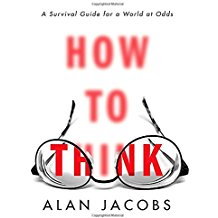How To Think
 How To Think: A Survival Guide for a World at Odds is a terrific little book (160 pp.) by Alan Jacobs, who teaches in the honors program at Baylor University. Despite the title, it isn’t really a “how-to” book, at least in the sense of boiling thinking down to a technique or number of steps. It is a series of interwoven essays that explore the pleasures and dangers of thinking. And Jacobs has his eyes on our particular moment (though not only ours), when thinking is often subordinated to group belonging.
How To Think: A Survival Guide for a World at Odds is a terrific little book (160 pp.) by Alan Jacobs, who teaches in the honors program at Baylor University. Despite the title, it isn’t really a “how-to” book, at least in the sense of boiling thinking down to a technique or number of steps. It is a series of interwoven essays that explore the pleasures and dangers of thinking. And Jacobs has his eyes on our particular moment (though not only ours), when thinking is often subordinated to group belonging.
That — the relationship of thought to being part of a group or collective — is really one of Jacob’s central themes. Speaking of the use of what he calls “key words” (words that signal being part of a particular group) he writes, “The more useful a term for marking my inclusion in a group, the less interested I will be in testing the validity of my use of the term against — well, against any kind of standard.”
That said, Jacobs argues against the use of the phrase and the idea of “thinking for yourself.” We can’t really do that. We think, and should think, with others. The question is what kind of groups do we do our thinking with? Are they groups that tolerate, even encourage, questions and difference or are they groups that demand conformity?
Jacobs draws on a 1944 talk given by C. S. Lewis on what Lewis termed “the Inner Ring.” Other terms for it would be “the in-group” or “the inner circle.” Within organizations (church, school, business) the Inner Ring may have no formal authority or title, but they determine how things works. The Inner Ring. Sounds Tolkien-esque, doesn’t it?
Lewis said, “I believe that in all men’s lives at certain periods, and in many men’s lives at all periods between infancy and extreme old age, one of the most dominant elements is the desire to be inside the local Ring and the terror being left outside.” Lewis takes it a step further. “Of all the passions the passion for the Inner Ring is most skillful in making a man who is not yet a very bad man do very bad things.”
Think Nazis, hate crimes, the impulse to divide the world between those “like us” and those “unlike us,” and garden variety cruelty like snubbing someone who isn’t “in.”
We find ourselves living in a time, and with a President, who is an adept at keyword signaling to create and enforce an Inner Ring, and demonize those on the outside. But, of course, this is not just a Trump or right-wing thing. It is, at this moment pervasive in our society. There’s a lot of keyword signaling and Inner Ring-ism on the left as well. Seattle is awash in the latter.
But if we do our thinking socially and not solo — Jacobs is right in this — is there an alternative to the Inner Ring tribalism?
There is. Here’s Jacobs:
“But for people of all ages, some form of genuine membership is absolutely necessary for thinking. We have already seen that it is not possible to ‘think for yourself’ in the sense of thinking independently of others; and we have likewise seen how the pressures imposed on us by Inner Rings make genuine thinking almost impossible by making belonging contingent on conformity. The only real remedy for the dangers of false belonging is the true belonging to, true membership, in a fellowship of people who are not so much like-minded as like hearted.”
A bit later Jacobs expands on that last thought. The people who constitute such a “fellowship,” or one might say community, “Are not necessarily like-minded, but they are temperamentally disposed to openness and have habits of listening — and in that sense are wonderfully like-hearted.”
I like Jacob’s distinction between a like-minded group and a like-hearted one. In the latter disagreement is possible and does not erode our basic regard for one another.
Years ago now, when I was considering a call to Plymouth Church in Seattle, one member of the church’s Search Committee used a phrase that has stuck with me. Plymouth was then beset by a particularly acrimonious conflict. Janet Steputis (Perry), a true saint of that church, said that her hope was that, “Plymouth could be a place where people were able to think out-loud together.” I loved that. To me it meant, that one could test various thoughts, ask hard questions, and offer provisional proposals without getting hammered or stigmatized by harsh judgments or self-righteous thought-police.
I don’t suppose any group or church ever fully realizes that aspiration, but I think we did take steps in that direction at Plymouth during my time. The Christian teaching that we are all sinners in need of grace is capable, when taken seriously, of contributing to such a climate of openness and listening.
So Jacobs addresses some real challenges in these tribal times of ours, and does so with hope and grace. Treat yourself to a copy and a good read.
![Anthony B. Robinson [logo]](https://www.anthonybrobinson.com/wp-content/themes/anthonybrobinson/images/logo.png)
![Anthony B. Robinson [logo]](https://www.anthonybrobinson.com/wp-content/themes/anthonybrobinson/images/logo-print.png)